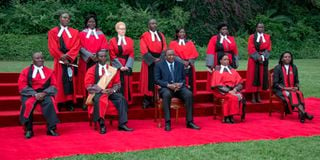Premium
We must reject all attempts to erode power and dignity of the people

President Uhuru Kenyatta and Chief Justice Martha Koome (second right)] with Judges of the Court of Appeal at State House, Nairobi during the swearing-in ceremony of recently gazetted Judges. On the right is Chief registrar of the Judiciary, Anne Amadi. PSCU
What you need to know:
- If Kenya is a republic, it follows that public participation as an institution is superior to other deliberative assemblies.
- The people must have ample opportunity to exercise their power at all times.
A horrific disaster recently unfolded before the Constitutional Court. Our worst fear – that our most influential potentates have neither the will nor ability to function within the framework of the Constitution – came to pass.
This explains the State’s profound dysfunction as well as the desperate keening of its homesick leaders for the excesses of the auld lang syne.
The Attorney-General, as their ideological field marshall, had a particularly hard time.
His contretemps in the jurisprudential theatre of battle humiliated the sinister cabal of the old order.
Through a plastic, unimaginative, reactionary and clerical articulation of elementary constitutional comprehension, the AG totally failed to rise to an enlightened appreciation of the magnitude of the Kenyan people’s civic accomplishment in promulgating the Constitution of Kenya 2010.
To be fair, this is an intellectual deficiency that afflicts a great number of powerful people in government. As has been held time without number, a proper interpretation of the Constitution is evidenced by ability to speak to the charter’s internal consistency. The Constitution’s self-evident integrity is demonstrated by the coherence with which its principles and provisions align.
Tyrannical plutocrats
This fluency in constitutional design is not accidental, and arises from the people’s determination to anchor the dispensation on values and principles. The ultimate goal of this enterprise is to express Kenya as a republic in thought, word and deed.
A republic literally belongs to the people. Res publicus means the public’s thing, an entity of the people. Mindful of this, the Constitution consciously departs from former notions of proto-feudal, patrimonial expressions of State power favoured by tyrannical plutocrats, and locates the people as the sole means and ends of government.
The declaration of the republic is, therefore, the first warning shot before the statement that all power in the republic belongs to the people. If that is the case, the people must take all decisions in government, either directly, or, whenever they do so through delegation, the agents are saddled with the onerous burden of full and explicit deference to the will of the people.
If Kenya is a republic, it follows that public participation as an institution is superior to other deliberative assemblies, including Parliament. How public participation goes in Kenya is a matter affecting the legitimacy of the State.
The people must have ample opportunity to exercise their power at all times. This opportunity is not restricted to the staging of forums known as “public participation”.
Informational base
It extends to investing utmost effort to ensure that the people fully and effectively express themselves.
For this to happen, the people’s fundamental freedoms of thought and expression must be seen to be vital governance priorities.
A sound informational base, through education and provision of relevant data to every citizen ,is one limb of the imperative.
The other is protection and promotion of the citizens’ opportunity to inform governance. Freedom of expression must be observed to extend beyond speech, into every other way through which the human person actualises herself.
Labour is a form of human actualisation and self-expression. All occupations in the world not only serve useful social and economic functions; they are the platforms for the flourishing of the divine spark resident in every human soul.
It is no coincidence that the most established philosophical and religious traditions share a categorical commitment to the dignity of labour. Workers are incidentally instruments of capitalist production. Primarily, they are political agents actively engaged in individual and collective self-expression.
Rampant unemployment, flagrant and ubiquitous violation of workers’ rights are, therefore, not only shortcomings of the economic order, they are transgressions against human dignity comparable – if not tantamount – to crimes against humanity.
The distortions in Kenya’s labour market are accessory delicts. In Kenya, gross undervaluation and vicious taxation of the worker’s labour goes hand-in-hand with the spectacular over-valuation and exemption from tax of politicians’ labour.
Political clowning
The incentives signalled by this perverse policy are terrible and, as a result, honest labour is despised, while political clowning is glorified. It is also no accident that politicians can hardly disguise their aversion for labour and their contempt for workers.
It is clear, therefore, that our leadership has invested tremendously to degrade the dignity of the citizen’s person and displace the people from their rightful position as the owners of sovereignty in our republic.
The Executive and Parliament are united in this crime. “You make it sound like you pay a lot of taxes,” a legislator carelessly replied to a harmless remark on social media last weekend.
The reckless violence of this statement is a terrifying, yet accurate indication of what has become of our republic.
Instead of the people coming first, as per the Constitution, they come last in our political practice.
The Constitution requires State authority, being a public trust, to be exercised in a manner that demonstrates respect for the people. Why do we encounter toxic disrespect everywhere? We must reject active attempts to overthrow the people to protect the integrity of our Republic.
Mr Ng’eno is an advocate of the High Court and former State House Speech Writer. @EricNgeno





